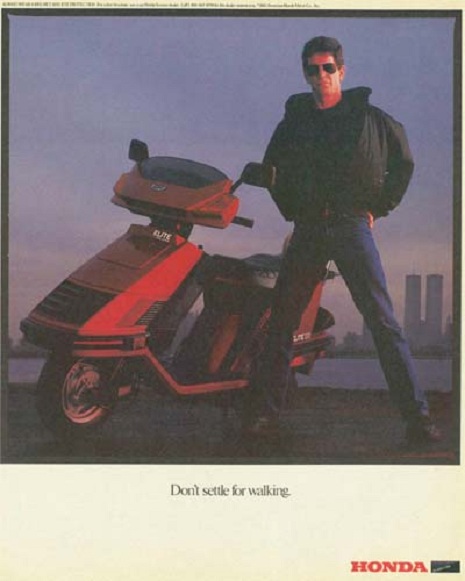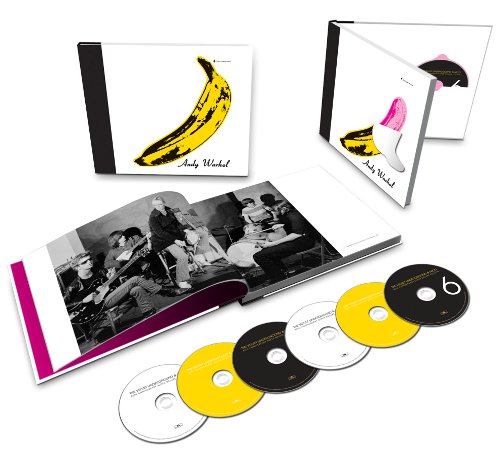The first Velvet Underground Album only sold 5,000 copies, but everyone that bought it filed a lawsuit.
Welcome back to Stately KI2Y Manor! Mrs. Keepit and I have finished our summer additions to the old pile (new trout pond, a velodrome, more stables and outdoor side-by-side bathtubs, in case I ever need Cialis) so this column is back in business. Right, off we go!
 Last January Velvet Underground founders Lou Reed and John Cale filed an infringement lawsuit against the Andy Warhol Foundation for the Visual Arts in New York federal court. The suit concerned licensing rights to the album cover of The Velvet Underground & Nico, the band’s first album released in 1967. Seen up top, the original cover art showed a Warholed-up yellow banana sticker with the instruction ”peel slowly and see.” If you peeled it what you saw was a pink banana. A naked banana, so to speak. (If you’ve got an original version with the sticker you can sell it and send your kid to college.) The erotic banana is the lesser known and perhaps more interesting image but it’s not the one the proto-punk godfathers are suing about.
Last January Velvet Underground founders Lou Reed and John Cale filed an infringement lawsuit against the Andy Warhol Foundation for the Visual Arts in New York federal court. The suit concerned licensing rights to the album cover of The Velvet Underground & Nico, the band’s first album released in 1967. Seen up top, the original cover art showed a Warholed-up yellow banana sticker with the instruction ”peel slowly and see.” If you peeled it what you saw was a pink banana. A naked banana, so to speak. (If you’ve got an original version with the sticker you can sell it and send your kid to college.) The erotic banana is the lesser known and perhaps more interesting image but it’s not the one the proto-punk godfathers are suing about.
VU’s gripe is that the Warhol Foundation had licensed the Banana image for consumer goods like iPod and iPad accessories. Sidestepping the cheap humor attendant to licensing a banana to Apple (yes, yes, low-hanging fruit — I get it), the band sued for both copyright and trademark infringement. On September 7, District Court Judge Alison Nathan dismissed the copyright claims but allowed the trademark claims to go ahead.
The copyright claim was a little dodgy in the first place because, when the album first came out, there was no copyright notice on the jacket. Rights in the image were further clouded by the fact that Warhol’s artwork was based on ”an element of an advertisement in the public domain.” That it is to say, Warhol, um, appropriated it for artistic purposes. For this reason, the band’s original complaint alleged that Warhol’s Banana itself was in the public domain. Perhaps realizing that Warhol’s stylized fruit could be protectable as a derivative work, the band filed an amended complaint alleging that ”even if the Banana design has not been in the public domain at all times, the Warhol Foundation can’t claim copyright on it.”
The Warhol Foundation countered by offering the band a “covenant not to sue for copyright infringement;” an agreement that the band could do what they wanted with the image and the Foundation wouldn’t come after them in court. The Foundation moved to dismiss the suit since the covenant eliminated any copyright beef between the parties. The band argued that the covenant offers them no protection if they decide to license the album image themselves. But the judge ruled that the Warhol Foundation covenanted not to sue any ”person or entity claiming to be in privity of contract with VU,” and so the band’s attempts to exploit the image won’t result in a copyright suit by the Foundation. Since no claims will arise between the parties, the judge dismissed the copyright portion of the Banana suit, because it wasn’t ripe. (Sorry.) Too bad because now we might never get to find out who actually owns the freakin’ artwork.

Fortunately, the band’s trademark claim is still intact. The 411 is that the banana image ”has become so identified with The Velvet Underground… that members of the public, particularly those who listen to rock music, immediately recognize the banana design as the symbol of The Velvet Underground.” The band doesn’t want the public to think that they endorse whatever commercial crap the Banana gets plastered on to. This is a grave matter of principle: Lou Reed is a man of artistic integrity who would never stoop to lend his work or image for the base purpose of shifting merchandise. Oh, wait, here’s an ad Lou appeared in to hawk Honda scooters. Whatevs!
The Warhol Foundation’s defense is that the band isn’t entitled to trademark protection for an ”ongoing” business since VU broke up in 1972. In fact, the entire original line-up was long gone by then. Toneless chanteuse Nico, whom Warhol foisted on the band in his role as ”producer,” only appeared on the first record. Cale left the group in 1968, Reed in 1970, and drummer Moe Tucker and guitarist Sterling Morrison both in 1971. Nico died in 1988. VU briefly reformed for a European tour in 1993 — but that was the last ride for the Velvets. Morrison died in 1995 and, apart from assorted reissues, tributes and the inevitable exhumation of ”lost” archival material, there has been no activity from the band in almost twenty years.
 Still, The Velvet Underground & Nico truly is a landmark album, and the Banana-emblazoned disc has come to be recognized as one of the most influential in rock history. At the time, no one was releasing records that sounded anything like the Velvets. Remember, it hit the stores just after the Summer of Love. While the Beatles harmonized about how they’d love to take us home with them they’d love to take us home, the Velvets’ message was somewhat more antagonistic: ”White boy, what you doin’ uptown?” Their stripped-down songs about drug abuse, prostitution and sado-masochism, delivered unsmilingly in their black leather kit, posed a stark contrast to their blissed-out hippie contemporaries. VU drew the blueprint for punk rock and unapologetically put the Drugs in sex, drugs and rock ‘n roll. Brian Eno apocryphally remarked that while not too many people bought the Velvets’ first album when it came out, ”everyone that did formed a band.” Released by jazz label Verve, who thought that the group’s association with the burgeoning Warhol media empire would ensure its success, the record was a commercial failure.
Still, The Velvet Underground & Nico truly is a landmark album, and the Banana-emblazoned disc has come to be recognized as one of the most influential in rock history. At the time, no one was releasing records that sounded anything like the Velvets. Remember, it hit the stores just after the Summer of Love. While the Beatles harmonized about how they’d love to take us home with them they’d love to take us home, the Velvets’ message was somewhat more antagonistic: ”White boy, what you doin’ uptown?” Their stripped-down songs about drug abuse, prostitution and sado-masochism, delivered unsmilingly in their black leather kit, posed a stark contrast to their blissed-out hippie contemporaries. VU drew the blueprint for punk rock and unapologetically put the Drugs in sex, drugs and rock ‘n roll. Brian Eno apocryphally remarked that while not too many people bought the Velvets’ first album when it came out, ”everyone that did formed a band.” Released by jazz label Verve, who thought that the group’s association with the burgeoning Warhol media empire would ensure its success, the record was a commercial failure.
Years later, in 2000, it was included it in NPR’s ”NPR 100″ series of “the most important American musical works of the 20th century.” In 2003, Spin magazine placed it atop their ”Top Fifteen Most Influential Albums of All Time.” Corporate tool Rolling Stone ranked it at number 13 on their list of the 500 Greatest Albums Of All Time. And in just a couple of weeks, Universal is reissuing the album yet again in celebration of its birthday, 45 years ago on October 1. This time it gets the ”Super Deluxe” treatment: six discs featuring the original recordings, outtakes, a film, a live concert and the always mirthful studio banter. Best of all, everyone’s favorite plantain will appear in various stages of undress; a rock n’ roll trademark every bit as distinctive as, say, the Stones’ Tongue.
 Me, I’m not buying the idea that the celebrated Banana can’t stand as a trademark just because the group no longer exists. The Ramones all croaked but their merchandise is still enjoying strong sales. Same with CBGB gear, despite the fact that the Bowery punk epicenter is now a posh cupcake shop or whatever. The judge hasn’t indicated how or whether the court will rule on the VU’s trademark claims. Stay tuned.
Me, I’m not buying the idea that the celebrated Banana can’t stand as a trademark just because the group no longer exists. The Ramones all croaked but their merchandise is still enjoying strong sales. Same with CBGB gear, despite the fact that the Bowery punk epicenter is now a posh cupcake shop or whatever. The judge hasn’t indicated how or whether the court will rule on the VU’s trademark claims. Stay tuned.






Comments